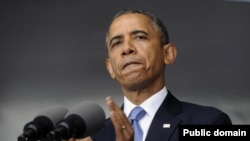In the second half of the twentieth century and into the third millennium, advocacy for democracy and respect for human rights have been central components of U.S. foreign policy. That’s because not only does our support of democracy promote such fundamental American values as religious freedom and worker rights, but also because acting on behalf of human dignity is in our national interests, said President Barack Obama during a major policy speech at the U.S. Military Academy in West Point, New York:
“America’s support for democracy and human rights goes beyond idealism -- it is a matter of national security. Democracies are our closest friends and are far less likely to go to war. Economies based on free and open markets perform better and become markets for our goods. Respect for human rights is an antidote to instability and the grievances that fuel violence and terror.”
Even though too many governments are still cracking down on civil society, and are ever more tightly abridging their citizens’ rights to freedom of speech and of peaceful assembly, “more people live under elected governments today than at any time in human history,” said President Obama. “Even the upheaval of the Arab World reflects the rejection of an authoritarian order that was anything but stable, and now offers the long-term prospect of more responsive and effective governance,” he said:
“Ultimately, global leadership requires us to see the world as it is, with all its danger and uncertainty. We have to be prepared for the worst, prepared for every contingency. But American leadership also requires us to see the world as it should be -- a place where the aspirations of individual human beings really matters; where hopes and not just fears govern; where the truths written into our founding documents can steer the currents of history in a direction of justice.”
“The question we face,” said President Obama, “is not whether America will lead, but how we will lead -- not just to secure our peace and prosperity, but also extend peace and prosperity around the globe.”
American leadership also requires us to see the world as it should be."President Barack Obama
Even though too many governments are still cracking down on civil society, and are ever more tightly abridging their citizens’ rights to freedom of speech and of peaceful assembly, “more people live under elected governments today than at any time in human history,” said President Obama. “Even the upheaval of the Arab World reflects the rejection of an authoritarian order that was anything but stable, and now offers the long-term prospect of more responsive and effective governance,” he said:
“Ultimately, global leadership requires us to see the world as it is, with all its danger and uncertainty. We have to be prepared for the worst, prepared for every contingency. But American leadership also requires us to see the world as it should be -- a place where the aspirations of individual human beings really matters; where hopes and not just fears govern; where the truths written into our founding documents can steer the currents of history in a direction of justice.”
“The question we face,” said President Obama, “is not whether America will lead, but how we will lead -- not just to secure our peace and prosperity, but also extend peace and prosperity around the globe.”






